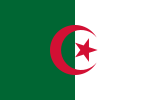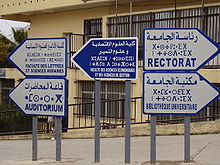
Back لغات الجزائر Arabic Llingües d'Arxelia AST আলজেরিয়ার ভাষা Bengali/Bangla Lenguas de Argelia Spanish Langues en Algérie French Fiteny ao Alzeria Malagasy Языки Алжира Russian Мови Алжиру Ukrainian الجزائر کی زبانیں Urdu Jazoir tillari Uzbek
| Languages of Algeria | |
|---|---|
| Official | Arabic Tamazight |
| Regional | Hassaniya Arabic (unrecognized) Korandje (unrecognized)[1] |
| Vernacular | Varieties of Arabic (81.5%)[2]
Berber languages (15.4%) |
| Immigrant | Turkish |
| Foreign | French 70% English 30% |
| Signed | Algerian Sign Language |
| Keyboard layout | |
| Part of a series on the |
| Culture of Algeria |
|---|
 |
| People |
| Mythology |
| Art |

Arabic, particularly the Algerian Arabic dialect, is the most widely spoken language in Algeria,[3][4] but a number of regional and foreign languages are also spoken. The official languages of Algeria are Arabic and Berber,[5] as specified in its constitution since 1963 for the former and since 2016 for the latter.[6][7] Berber has been recognized as a "national language" by constitutional amendment since 8 May 2002. In February 2016, a constitutional resolution was passed making Berber an official language alongside Arabic. Arabic is spoken by about 81% of Algerians,[4] while Berber languages are spoken by 27%.[3][8] French, though it has no official status, is still used in media (some newspapers) and education due to Algeria's colonial history. Kabyle, with 3 million speakers, is the most spoken Berber language in the country, is taught and partially co-official (with a few restrictions) in parts of Kabylie.
The 1966 Algerian census, the last to include a question about the mother tongue, showed that 81.5% of the population spoke Arabic as a native language, with about half of the Berber population also speaking it as a second language, while 17.9% spoke Berber languages natively.[9][10]
Malika Rebai Maamri, author of "The Syndrome of the French Language in Algeria," said "The language spoken at home and in the street remains a mixture of Algerian dialect and French words."[11] Due to the number of languages and complexity involving those languages, Maamri argued that "[t]oday the linguistic situation in Algeria is dominated by multiple discourses and positions."[11]
- ^ Lewis, M. Paul, ed. (2009). "Languages of Algeria". Ethnologue: Languages of the World (sixteenth edition). SIL International. Retrieved 2010-01-08.
- ^ "Languages of Algeria". Algeria.com. Retrieved 2024-07-11.
- ^ a b c "What Languages Are Spoken In Algeria?". WorldAtlas. 2019-06-13. Retrieved 2024-07-11.
- ^ a b "Languages of Algeria". Algeria.com. Retrieved 2024-07-11.
- ^ Constitution of Algeria.
- ^ Tamazight official in Algeria
- ^ "Algeria reinstates term limit and recognises Berber language". BBC News. 7 February 2016.
- ^ Leclerc, Jacques (2009-04-05). "Algérie: Situation géographique et démolinguistique". L'aménagement linguistique dans le monde. Université Laval. Archived from the original on 2010-01-24. Retrieved 2010-01-08."Aujourd'hui, la majorité des Algériens sont arabophones dans une proportion de 72 %. Parmi les Arabophones, c'est l'arabe algérien qui dominent nettement avec 60 % de la population totale et 83,2 % des arabophones. Les autres arabophones parlent le hassaniyya (11,3 %), l'arabe marocain (0,4 %), l'arabe du Sahara (0,1 %), l'arabe égyptien, voire l'arabe irakien. Toutes les variétés d'arabe appartiennent au groupe sémitique de la famille chamito-sémitique. Mais tous les arabophones d'Algérie parlent l'arabe dialectal ou l'arabe dit algérien (ou ses diverses variétés) pour communiquer entre eux. Autrement dit, à l'oral, c'est l'arabe algérien qui sert de langue véhiculaire, mais à l'écrit, c'est l'arabe classique."
- ^ Nyrop, Richard F.; Studies, American University (Washington, D. C. ) Foreign Area (1972). Area Handbook for Algeria. U.S. Government Printing Office. p. 105.
{{cite book}}: CS1 maint: multiple names: authors list (link) - ^ Kossmann, Maarten (2013-07-18). The Arabic Influence on Northern Berber. BRILL. p. 31. ISBN 978-90-04-25309-4.
- ^ a b Maamri, Malika Rebai. "The Syndrome of the French Language in Algeria." (Archive) International Journal of Arts and Sciences. 3(3): 77 – 89 (2009) CD-ROM. ISSN 1944-6934 p. 10 of 13